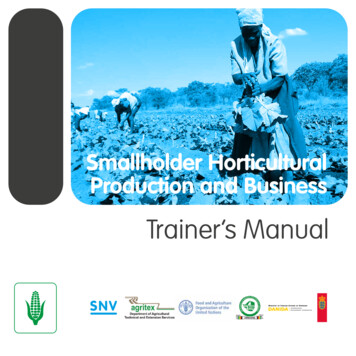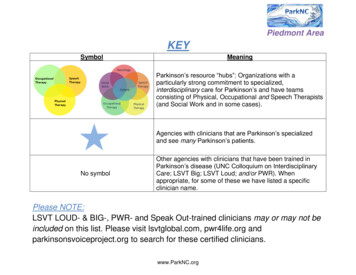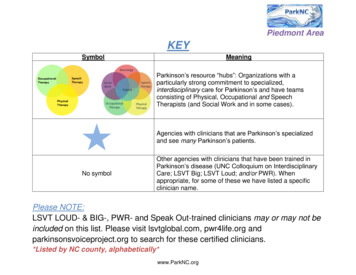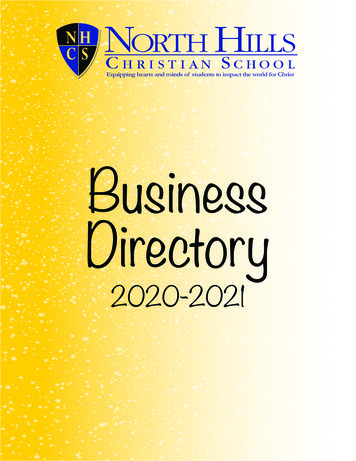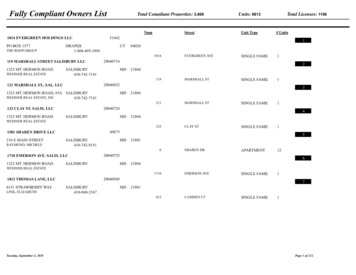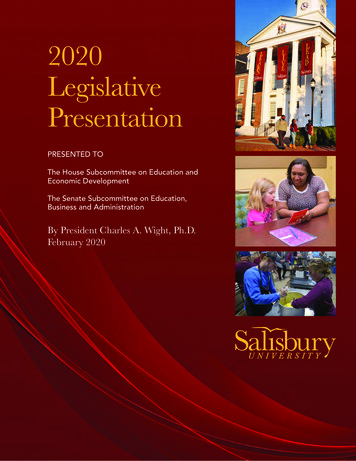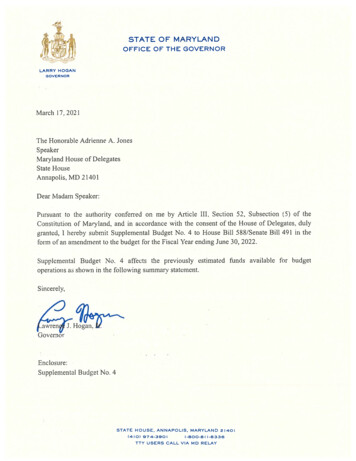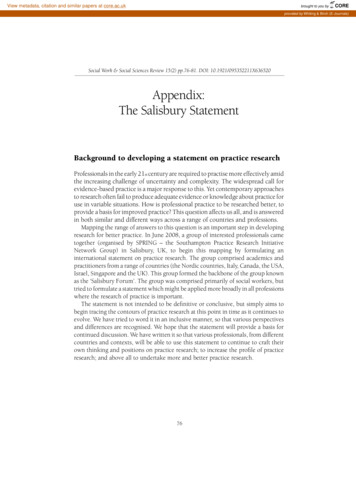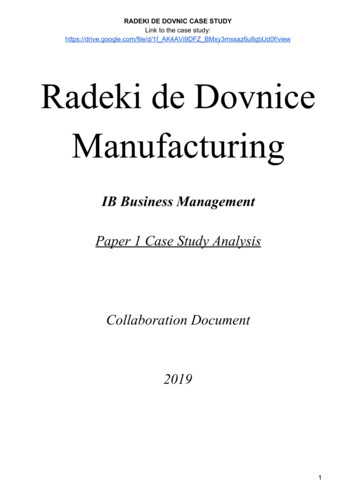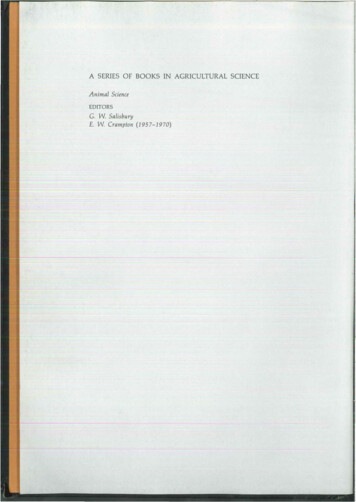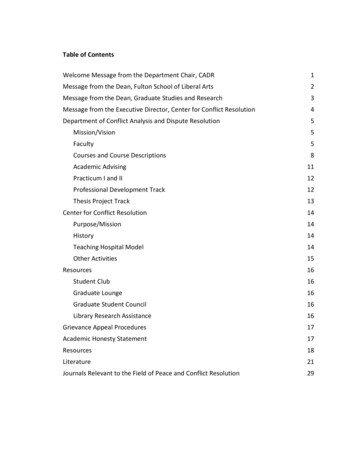
Transcription
Table of ContentsWelcome Message from the Department Chair, CADR1Message from the Dean, Fulton School of Liberal Arts2Message from the Dean, Graduate Studies and Research3Message from the Executive Director, Center for Conflict Resolution4Department of Conflict Analysis and Dispute Resolution5Mission/Vision5Faculty5Courses and Course Descriptions8Academic Advising11Practicum I and II12Professional Development Track12Thesis Project Track13Center for Conflict Resolution14Purpose/Mission14History14Teaching Hospital Model14Other Activities15Resources16Student Club16Graduate Lounge16Graduate Student Council16Library Research Assistance16Grievance Appeal Procedures17Academic Honesty Statement17Resources18Literature21Journals Relevant to the Field of Peace and Conflict Resolution29
Welcome Message from the Department ChairIt is with great pleasure that I welcome you to the Master’s Program in ConflictAnalysis and Dispute Resolution (MACADR) at Salisbury University. Our programenjoys a well-known reputation and has grown rapidly in the last few years. I am gladto note that the program continues to demonstrate immense potential to become anorganization of national and international distinction. There are two specific reasonsfor this. The first is we always attract a diverse and highly qualified pool of applicants,most of whom have considerable real-life experience in conflict and peace relatedissues. More than 25 percent of our students come from other countries. This makesthe classroom experience unique. In addition, our students are gaining employmentin a wide range of critical social sectors and some of our alum heading for academicposts has already begun to publish in reputed journals. The second reason is that ourfaculty probably are the most diverse and international within Salisbury University.They constantly publish and engage in academic and a wide range of professionalactivities. Our students always appreciate the friendly attitude and approachability ofthe faculty. Working with them will be fun. In addition, the Center for ConflictResolution (CCR), an integral part of the program that provides valuable practicaltraining and research opportunities, is available should you be interested. I stronglyurge you to make use of the vast experience of our faculty and the resources at theCCR. Also, the University offers a multitude of tools for personal and academicdevelopment. I am sure you will take advantage of these opportunities as well. I lookforward to working with you in the coming two years and beyond.Dr. Soosaipillai I. KeethaponcalanChair, Conflict Analysis and Dispute ResolutionHolloway Hall (HH) 106410-543-6435 or ext .36435iksoosaipillai@salisbury.edu1
Message from Maarten Pereboom, Dean, Fulton School of Liberal ArtsWelcome to Salisbury University and one of its outstanding graduate programs! OurMaster of Arts Program in Conflict Analysis and Dispute Resolution has drawn a fullcohort of students every year since we launched it in 2009. It is a diverse group inevery sense, from recent college graduates to experienced professionals, from localresidents to students from around the world, and they bring a rich variety ofexperiences to the program. This exciting, but relatively new, academic field has agreat many professional applications, and our program prepares individuals formediation and conflict resolution work in a great many sectors across the workforce,including justice and law enforcement, government, business, education andnongovernmental organizations. Our students increase their skills in research,analysis and communications as they draw on their reasoning skills as well as theiremotional intelligence to work with parties in conflict. We have an excellent team offaculty members, and they promote a great sense of camaraderie among students. Iam proud of the early successes of our M.A. graduates and wish you every success asyou complete our program and put your education to work.Dr. Maarten PereboomDean, Fulton School of Liberal ArtsFulton Hall (FH) 255410-543-6450 or ext. 36450mlpereboom@salisbury.edu2
Message from Clifton Griffin, Dean, Graduate Studies and ResearchWelcome to graduate studies at Salisbury University! The Master of Arts Program inConflict Analysis and Dispute Resolution (MACADR) is one of our most outstandingprograms! The CADR faculty members are recognized for their internationalprominence, and during the course of your program, you will be immersed in realworld examples from faculty who have participated actively in the field of disputeresolution. Aside from your particular program, this is an exciting time to be agraduate student at SU! We are actively increasing the number of graduate programsat SU and now offer two doctoral programs. The Graduate Student Council givesgraduate students a dependable opportunity to participate in University sharedgovernance. I urge you to participate in the council and other cultural and socialactivities outside of your program. Learn all you can within your program, but alsoenjoy yourself! You should work hard, delve deep into your studies and have somefun all at the same time. Please do not hesitate to contact the Office of GraduateStudies and Research if we can help you have a meaningful experience.Sincerely,Dr. Clifton P. GriffinDean, Graduate Studies and ResearchHolloway Hall (HH) 262A410-548-3894 or ext. 83894cpgriffin@salisbury.edu3
Message from the Executive Director, Center for Conflict ResolutionThe Center for Conflict Resolution Inc. (CCR) is a nonprofit organization that is fullyintegrated into the Department of Conflict Analysis and Dispute Resolution andSalisbury University. The Center began operations in 1992 and in 2000 underwent aredesign to mimic the teaching hospital model found in medical schools. Theacademic mission of the Center is to mentor conflict analysis and dispute resolutionstudents, when feasible and practical, as well as to act as a resource to the entireuniversity and local community. Center staff and faculty have worked with hundredsof students on independent fieldwork, research, program development, training andteaching projects across the state and region as well as in over 20 countries.The Center has three complimentary teams: We are home to one of the longest established and well-respected trainingand service teams in the state. We work to meet a variety of localcommunity needs, providing services such as mediation and facilitation forindividuals or groups, conflict coaching, mediation training, the moderationof public dialogues or the training of teachers and students in a variety ofproblem solving skills. We are home to a world-class research team that conducts major evaluationprojects of statewide, national and international conflict managementsystems, programs and processes. The team employs several graduates ofthe master’s program. Recent research projects include a comprehensiveevaluation of ADR processes across Maryland courts, a classified multi-yearstudy of the Transportation Security Administration’s Integrated ConflictManagement System, a nationwide study of the U.S. Equal EmploymentOpportunity Commission’s mediation program, an evaluation of the State(Maryland) Highway Administration’s construction partnering program, andthe State of California’s Department of Fair Housing and Employment’smediation program – to name a few. The Center is also home to a world-class practice team of retired U.S.Ambassadors, federal officials who have led agency-wide alternative disputeresolution programs, retired law professors and others who spent a largeportion of their professional careers developing conflict prevention andmitigation programs. Since 2000, the practice team has worked in over 30countries and across the U.S. intervening in and moderating challengingissues relating to topics such as water rights and water management in theMiddle East, retooling government legal systems in order to conform toEuropean Union standards, developing a nationwide system of conflictresolution centers and practitioners for entire countries (in process), andbillion dollar construction management projects. Since 2000, we have aidednearly 20 academic programs located across the globe as well as a dozen inNorth America.Dr. Brian PolkinghornProfessor and Executive Director, Center for Conflict Resolution, Inc.410 219-2873bdpolkinghorn@salisbury.edu4
DEPARTMENT OF CONFLICT ANALYSIS AND DISPUTE RESOLUTIONMission/VisionThe Master of Arts in Conflict Analysis and Dispute Resolution addresses the local, regional, state, nationaland international need for highly skilled conflict resolvers to work within judicial, governmental and social servicesystems, as well as in educational and religious communities. This program empowers students with theknowledge and advanced skills needed to work effectively in this field. Conflict resolvers currently findemployment in virtually every aspect of society, working in international capacities as well as within local townsand neighborhoods helping people deal productively with conflict and training others to do so for themselves.FacultyDr. Soosaipillai I. KeethaponcalanDr. S.I. Keethaponcalan obtained his Ph.D. in conflict resolution from NovaSoutheastern University (FL) in 2001. He also has a Bachelor of Arts in politicalscience from the University of Jaffna, Sri Lanka, a Master of Arts in internationalrelations from the University of Colombo, Sri Lanka, and a Master of Science inconflict resolution from George Mason University (VA). Dr. Keethaponcalancurrently serves as the chair of the Department of Conflict Analysis and DisputeResolution at Salisbury University.Formerly, he was professor of political science and head of department of the Department of Political Science andPublic Policy, University of Colombo, Sri Lanka. Dr. Keethaponcalan has served as researcher and research fellow inseveral international agencies including the United Nations Institute for Disarmament Research in Geneva; theBonn International Center for Conversation in Bonn, Germany; and the Peace and Governance Program of theUnited Nations University in Tokyo, Japan. He was a recipient of such honors as JSPS–UNU (Japan Society for thePromotion of Science – United Nations University) Post-doctoral Fellowship (2007); Asialink Teaching Fellowship inthe Department of Social Anthropology, University of Bielefeld, Germany (2005); Mahbub Ul Haq ResearchFellowship of the Regional Center for Strategic Studies (RCSS), Colombo (2003); German Academic ExchangeProgram (DAAD) fellowship in the University of Heidelberg, Germany (2002); and the Rotary FoundationAmbassadorial Scholarship in the U.S.A (1995).Dr. Keethaponcalan has published widely on conflict and peace related issues in Sri Lanka and South Asia. TheFollowing are some of his publications; Conflict and Peace in Sri Lanka: Major Document (Kumaran Books, 2009),Sri Lanka, Perspectives on the Ceasefire Agreement of 2002 (co-edited, South Asia Peace Institute, 2009), MaritimeCooperation Between India and Sri Lanka (co-authored, Manohar Publishers, 2006), “The Indian Factor in thePeace Process and Conflict Resolution in Sri Lanka,” in Jonathan Goodhand, Jonathan Spencer and Benedikt Korf(eds.) Conflict and Peace-building in Sri Lanka: Caught in the Peace Trap (Routledge, 2011), “Ethno-political Conflictand the Civil War: Domestic and International Impact,” in V.R.Raghavan (ed) Conflict in Sri Lanka, Internal andExternal Consequences (Vij Books, 2011), and “Conflict Resolution Research in Sri Lanka,” in Moonis Ahmar (ed.)Conflict Resolution Research in South Asia (University of Karachi, 2010).5
Dr. Brian PolkinghornProfessor Polkinghorn was the University System of Maryland Wilson ElkinsProfessor and a Distinguished Professor of Conflict Analysis and Dispute Resolution.Since 2000, he has been the program director in the Department of ConflictAnalysis and Resolution and Executive Director of the Center for Conflict Resolution(CCR) at Salisbury University. Prior to 2000, he was the senior faculty member inthe Department of Conflict Analysis and Resolution, Nova Southeastern University.He has worked in the conflict intervention field since 1985 as a mediator, arbitrator,facilitator, trainer, researcher, academic program developer, conflict coach, disputesystems designer and ombudsman. His primary research and publications are in the areas of environmentaldisputes, graduate program developments in the English-speaking world, post-conflict development projects,conflict intervention programs, ADR court program assessment and, the evaluation of major government ADRprograms. He has published over 40 articles, books and book chapters and has been the principle (co-)investigatoror recipient of more than 50 grants. He has practiced in several dozen countries primarily in the areas ofenvironmental policy dispute intervention, labor-management, cross border cooperative enterprises, support ofpeace talks and civil society training. He is currently facilitating dialogues between Palestinian, Jordanian andIsraeli parties on water rights/usage, waste to energy and collaborative agricultural in the Jordan River basin. Hehas also worked on the peace process in Nepal.Polkinghorn is an alumnus of the Institute for Conflict Analysis and Dispute Resolution (ICAR), George MasonUniversity (M.S., conflict resolution, 1988) and the Program on the Analysis and Resolution of Conflicts (PARC),Syracuse University (M.A., M.Phil., Ph.D. 1994). He was also a Fellow with the Program on Negotiation (PON),Harvard University Law School (1991-1992), a National Fellow with the US Environmental Protection Agency (19911993), a United States Presidential Fellow (1991), and more recently a Senior American Fulbright Scholar with theEvens Program in International Conflict and Mediation at Tel Aviv University (2010).Dr. Thomas BoudreauThomas Boudreau, Ph.D., is professor in the Conflict Analysis and DisputeResolution Department at Salisbury University. As a graduate student, he attendedthe Maxwell School of Citizenship and Public Affairs at Syracuse University wherehe served as the research assistant for Donald T. Campbell, the Schweitzer Chair ofHumanities, as well as the administrative assistant for Dean Guthrie Birkhead, adecorated combat veteran of Patton’s Third Army in World War II.While in graduate school, Boudreau was appointed as project director for the Crisis Management Research Projectat the Carnegie Council for Ethics and International Affairs in New York City. While there, he served as a privateconsultant to the Executive Office of the United Nations Secretary-General (1982-1987), which resulted in his firstbook Sheathing the Sword, which is the definitive legal interpretation of Article 99 of the U.N. Charter. At SalisburyUniversity, he teaches courses in Theories of Conflict, International Negotiations and a course on Communications,Conflicts and Critical Incidents with personnel from the FBI Academy in Quantico, VA.Since leaving graduate school, Boudreau has taught international law at American and Syracuse universities, aswell as the University of Pennsylvania. He served as an unpaid legal advisor with Robert Silk, Esq. and his law firm6
to the Permanent Bosnian Mission to the United Nations during the Bosnian War (1992-1995). Boudreau haswritten several law journal articles on the new Law of Nations, including and "The Modern Law of Nations: JusGentium[The Digest] and the Roman Jurisprudence in Shaping the Post World War II International Legal Order,"and "the Law of Nations and John Locke Second Treatise" (2012 The Journal Jurisprudence.) He also plans tocomplete the book Law of Nations: Legal Order in a Violent World.Dr. Jacques KokoDr. Koko is the graduate program director for the Master of Arts Program In ConflictAnalysis and Dispute Resolution. He earned a Master of Arts in conflicttransformation and peacebuilding from Eastern Mennonite University in Virginia,and a Ph.D. in conflict analysis and resolution from Nova Southeastern University inFlorida. His work, teaching and research encompass organizational conflict analysisand resolution, peacemaking, peacekeeping, peacebuilding, culture and conflictresolution, religion and conflict resolution, school conflict resolution, indigenousmethods of conflict resolution, national security, leadership development, Somalipiracy, and local capacity building for development and peace.He has conducted trainings and participated in high-level negotiations in Africa. He also has conducted workshopsin my many regions of the world, including in the United States. In addition to English, Dr. Koko speaks French,Spanish and several African languages. He has published in both French and English on conflict resolution-relatedissues. Some recent publications include National Conference as a Strategy for Conflict Transformation andPeacemaking: The Legacy of the Republic of Benin Model, published by Adonis & Abbey Publishers (London, U.K.)in 2008; Determinants of Success in the United Nations Peacekeeping Operations, published by the University Pressof America in 2012; “Counteracting Dynamics of Violent Communication in Bullying,” published in 2013 by thePeace and Conflict Studies, 20 (2), 187-210; “A Theology of Mediation for Peacemaking in Africa,” published in2013 by the Journal for Peace and Justice Studies, 23(1), 23-43.Dr. Vitus OzokeDr. Vitus Ozoke is originally from Nigeria where he read and practiced law beforecoming to the United States. He obtained a Master of Laws (L.L.M.) from theUniversity of Miami (FL) and a doctorate in conflict analysis and resolution fromNova Southeastern University, Fort Lauderdale, FL.Dr. Ozoke’s research interests include civil wars and other ethnopolitical violence,their dynamics and their resolution, multiculturalism, indigenous systems of conflict resolution, civil societies andmass movements and their roles in conflict, socio-cultural aspects of conflict and its management, governance,governmental institutions and legal reforms, social identity and its conflict dynamics, social media, gender, humanrights, and social justice.Dr. Ozoke is an assistant professor in the Department of Conflict Analysis and Dispute Resolution, SalisburyUniversity. He is a member of the Nigeria Bar Association, a member of the Editorial Board of African Journal ofConflict Management. Dr. Ozoke recently published a book titled, Civil War Outcomes: A Predictive Insight.7
Rob La Chance, M.A.La Chance is lecturer for the Conflict Analysis and Dispute Resolution Department atSalisbury University and the managing director at the Center for Conflict Resolution,Inc. His primary research is in the areas of conflict analysis dispute resolution inhigher education, court alternative dispute resolution program evaluation,environmental disputes, international conflict intervention, conflict interventionthrough athletics, collective bargaining in sports, negotiation theory, partnering inconstruction and industrial application as well as conflict process and disputesystems design model building.He received bachelor’s degrees from Salisbury University in both conflict analysis and dispute resolution andphilosophy. He earned a master’s degree in international peace and conflict resolution at Arcadia University.Ambassador Todd BeckerA native of the Washington, D.C., area, Ambassador Robert (Todd) Becker grew upwith government and politics. He studied in Munich, Germany, and Vienna, Austria,and did his undergraduate and graduate work in German studies in Minnesota. HisWashington roots and European experience led to a career as a U.S. diplomat andinternational civil servant that stretched over some 45 years, focusing his work onpolitical analysis, practical negotiations and conflict management, prevention andsettlement. In his teaching, he draws extensively on his diplomatic experience andassignments in conflict areas in Europe and the Balkans.Since leaving diplomatic service, Becker has taught U.S.-European relations at Lawrence University and has offeredcourses in Diplomacy and Conflict, Complex Conflicts and Third Party Involvement in Dispute Resolution in theCADR Department at Salisbury University. He also teaches courses on European Comparative Government, TheEuropean Union and American Foreign Policy for the Political Science Department.Courses & Course DescriptionsCADR 500 - INTRODUCTION TO CONFLICT ANALYSIS AND DISPUTE RESOLUTION3 hours creditIntroduction to the various practices, history and formative theories of the field; basic analytical and conceptualframeworks; and how theory and practice reinforce each other. Explores how values and world views shapepractices and will include reflective exercises to individual styles, value sets and approaches to conflict andintervention. Three hours per week.8
CADR 510 - PROBLEM SOLVING, NEGOTIATION AND CONFLICT ASSESSMENT3 hours creditExplores basic negotiation and problem-solving theory and practice, from basic “two-party, one-issue disputes” tomore complex cases requiring additional intervention skills. Familiarizes with the negotiation process; providesexperience with conflict analysis and assessment; examines issues of effective data gathering, identification ofstakeholders and getting people to the negotiation table; and reviews the process of assessment as it relates toselecting appropriate conflict resolution practices. Three hours per week.CADR 520 - STRUCTURAL AND SYSTEMIC CONFLICT AND DISPUTE SYSTEM DESIGN3 hours creditExamines the hidden sources of conflicts that are often embedded in social, legal, political and organizationalstructures and systems. Emphasizes rules, regulations, roles, contractual obligations, laws, informal agreementsand other ties that bind people together to conflict among individuals and groups. Examines organization,institution or government for root causes of conflict and create a new system that addresses the underlying issues,including internal conflict management programs within the new system. Three hours per week.CADR 530 - MEDIATION THEORY AND PRACTICE3 hours creditGo beyond basic mediation and negotiation to engage in the major debates and nuances of practice in the field,specifically focusing on the interpersonal level of intervention. Distinctions are made concerning various mediationstyles and various schools of thought on how and when to intervene in a case. Create your own models of practicefrom a wide range of process skills and approaches and apply process and analytical knowledge to cases possessingvarious levels of complexity. Prerequisite: CADR 510. Three hours per week.CADR 540 - THEORIES OF CONFLICT AND CONFLICT RESOLUTION3 hours creditExamines theoretical base relating to conflict sources and conflict intervention. Provides a series of frameworks toplace conflicts into various conflict maps and conflict models that will be used to analyze complex conflictdynamics. Theory frames conflict and practical intervention decisions. Theory and practice serve to inform eachother in a cyclical, synergistic learning fashion. Three hours per week.CADR 550 - RESEARCH METHODS3 hours creditExplores various research methods for collecting, tracking, managing and analyzing quantitative and qualitativedata. Learn how research drives process, practical and theoretical developments. Includes a research project thatemploys various forms of data collection and analysis. Prerequisite: CADR 500. Three hours per week.CADR 600 - GROUP PROCESSES AND COMPLEX CONFLICTS3 hours creditExplores the complexities of large group interventions including organizational, intergroup and international work.Familiarizes students with the challenges of large-group consensus processes like multi-party arbitration,negotiated rule making, large case mediation and facilitation. Cover the special challenges of large-party disputes,such as working with representatives and constituents, external dynamics shaping the interaction at the table,engaging multiple levels of government and community, working internationally and dealing with the media.Prerequisites: CADR 500 and CADR 510. Three hours per week.9
CADR 610 - WORKSHOPS, TRAINING AND CONFLICT COACHING3 hours creditExamines services provided by conflict resolution practitioners. Learn how to construct a workshop and trainingfrom beginning to end. Design and implement a short training program for a local organization. Use the exercise toexamine questions pertaining to professional development such as: self-marketing, developing and presentingconflict intervention products, developing and maintaining a solid client base and how to delicately writeproductive reports and evaluations. Prerequisite: CADR 500. Three hours per week.CADR 620 - SPECIAL TOPICS3 hours creditA special topics course with varying content developed in response to faculty and student interests. Three hoursper week.CADR 630 - STUDIES IN CONFLICT ANALYSIS AND DISPUTE RESOLUTION3 hours creditSelected areas of study within varied subfields of conflict analysis AND dispute resolution. The content of thiscourse varies over time in response to faculty and student interests. Three hours per week.CADR 640 - FIELD PRACTICUM I3 hours creditDevelop and undertake an intensive, semester-long practicum, focusing on practical field-based experientiallearning. Develop practicum sites/projects with the assistance of the academic program coordinator. Provides thechance to test analytical and process skills in a live setting. The practicum will be mentored by a faculty advisor.Students must gain written permission from a faculty member to be their advisor on a particular practicum project.Students will need to have their site or project approved and a contract specifying their intentions approvedbefore the semester begins. Requires an average of five-six hours per week throughout the semester in addition totime reserved for classroom activity, reading and research for the final project. Prerequisites: CADR 500 and CADR520.CADR 641 - FIELD PRACTICUM II3 hours creditAn advanced self-guided practicum. Have the option to continue previous practicum experience begun in CADR640 or create a new practicum experience [subject to faculty approval]. Students seeking a second practicumexperience different than their first need to create a new contract with a faculty member design their practicumexperience and have it approved by the faculty before the semester begins. Requires an average of five-six hoursper week throughout the semester in addition to time reserved for classroom activity, reading and research for thefinal project. Prerequisites: CADR 640.10
CADR 650 - RESEARCH THESIS PROJECT3 hours creditPermission of the instructor is required to take this course. Students wishing to conduct a thesis must take thiscourse. Students who will pursue a thesis must make their intention known in their first year of study. In order tofinish on time, students need to begin the process at least one semester before the semester they undertake thecourse. This course is a seminar that assists students through the thesis process and helps them create a thesisproject of publishable quality. It also provides students the opportunity to act as peer reviewers for one another.Thesis students are expected to meet incremental goals identified by the faculty advisor. Finally, the thesis needsto be completed and publicly presented prior to the end of the student’s final semester. Prerequisite: CADR 550and permission of instructor. Three hours per week.CADR 651 - PROFESSIONAL DEVELOPMENT PROJECT3 hours creditPermission of the instructor is required to take this course. It is a requirement for students working on aprofessional development project. Students who choose to focus on professional development must make theirintention known in their first year of study. In order to complete the project on time, students need to begin theprocess at least one semester before the semester they undertake the course. This course is a seminar that helpsstudents execute their professional development project. Professional development project students are expectedto meet incremental goals identified by the faculty advisor. It also provides students the opportunity to act as peerreviewers for one another. The project needs to be completed and publicly presented prior to the end of thestudent’s final semester. Prerequisite: CADR 610 and permission of instructor. Three hours per week.Academic AdvisingAcademic advising is one of the most important services offered by Salisbury University. It is a processthat helps students identify their career goals and assists them in the development of an educational plan designedto meet these goals. Degree-seeking students at Salisbury University are assigned an academic advisor. Studentswho have a declared major are assigned a faculty advisor within their major department, while students who havenot declared their major are assigned faculty or professional advisors by the Office of Academic Affairs.It is the CADR Department’s belief that the quality of education that graduate students receive is greatlyenhanced if students receive good academic advising at all stages of their program. This means that the studentsneed good advising when they are being recruited, when they first register, at later stages in the program, andwhen they are graduating and looking for a job. Since academic advising is an on-going, intentional, educationalpartnership dedicated to student academic success, each graduate student is assigned a faculty member to betheir advisor and mentor throughout their academic program.It is to the students’ advantage to meet with their academic advisor at least once a semester and to knowthe advisor well. The student can always count on their academic advisor to give them accurate and completeinformation about the degree requirements and refer them to the appropriate source for the informat
Welcome to Salisbury University and one of its outstanding graduate programs! Our Master of Arts Program in Conflict Analysis and Dispute Resolution has drawn a full cohort of students every year since we launched it in 2009. It is a diverse group in every sense, from recent college graduates to experienced professionals, from local
